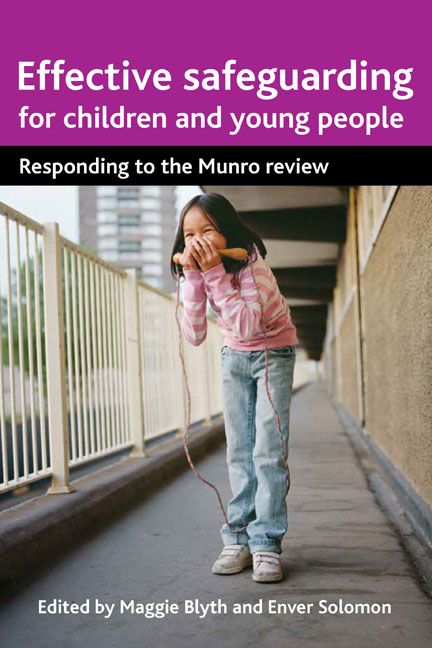Book contents
- Frontmatter
- Contents
- List of abbreviations
- Notes on contributors
- Acknowledgements
- Foreword
- one Early intervention
- two Local safeguarding children boards: faith, hope and evidence
- three The child's voice in the child protection system
- four Parental mental health, risk and child protection: what does Munro mean to child protection and adult mental health?
- five Adolescent-to-parent abuse and frontline service responses: does Munro matter?
- six Older children and the child protection system
- seven Serious case review
- Index
seven - Serious case review
Published online by Cambridge University Press: 07 September 2022
- Frontmatter
- Contents
- List of abbreviations
- Notes on contributors
- Acknowledgements
- Foreword
- one Early intervention
- two Local safeguarding children boards: faith, hope and evidence
- three The child's voice in the child protection system
- four Parental mental health, risk and child protection: what does Munro mean to child protection and adult mental health?
- five Adolescent-to-parent abuse and frontline service responses: does Munro matter?
- six Older children and the child protection system
- seven Serious case review
- Index
Summary
Whenever a child is deliberately injured or killed, there is inevitably great concern in case some important telltale sign has been missed. (Laming, 2003)
It is hard to argue against the simple idea that if a child has been deliberately killed or seriously harmed, society should do everything it can to learn whether safeguarding systems could be improved. The serious case review (SCR) process is fundamentally designed to do just that, yet it has become much maligned in recent years, with some commentators believing it is a weak process and others believing it is too heavily focused on apportioning blame. Since its introduction 20 years ago as the standard method of inquiry into the circumstances leading to cases in which children have died or been seriously harmed as a result of maltreatment, it has been possibly one of the most controversial aspects of the system used in England and Wales to safeguard children from abuse.
This chapter will explore whether a change of approach, as suggested by Professor Eileen Munro (Munro, 2011), might improve the outcomes in terms of learning and public confidence. It will also explore the relationship between the criminal justice system and the SCR and what happens when criminal proceedings are ongoing, and examine the role of independent people engaged in SCRs and how the voices of the child and family members are reflected in an SCR. It will, in effect, question whether changes to the current system are required.
A brief history
The government guidance Working together under the Children Act 1989 (DH et al, 1991) first laid out the formal requirements for conducting SCRs. The document stressed the need for central government to be informed, so that public statements could be issued and developments reviewed, and offered seven principles to underpin the process: urgency, impartiality, thoroughness, openness, confidentiality, cooperation and resolution (Sinclair and Bullock, 2002).
For several years after their introduction it was not possible to establish exactly how many SCRs were commissioned on an annual basis, but Sinclair and Bullock (2002) estimated that there were likely to be around 90. Since 2007, when Ofsted took over the recording and scrutiny of SCRs, there has been a better central monitoring mechanism, and during the period between April 2007 and March 2009, 268 were conducted (Brandon et al, 2010), which equates to a likely current average of around 130 SCRs a year in England and Wales.
- Type
- Chapter
- Information
- Effective Safeguarding for Children and Young PeopleWhat Next after Munro?, pp. 127 - 144Publisher: Bristol University PressPrint publication year: 2012



